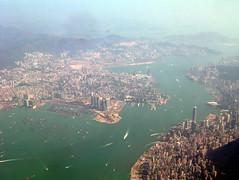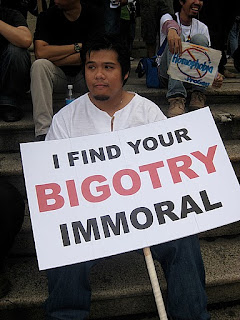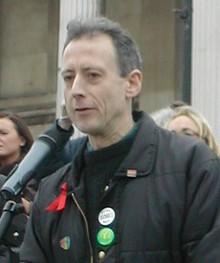By Peter Tatchell
Caroline Benn Memorial Lecture 2009
Delivered 13 October 2009 at Bishop Grosseteste University College, Lincoln, UK.
It is a very great honour, and joy, to deliver the Caroline Benn Memorial Lecture 2009. Caroline was a friend and comrade. I remember her with much affection. She left us with a fine humanitarian legacy as a leading advocate of comprehensive education and better educational opportunities. She also lives on, in spirit, through her inspiring, passionate support for socialism, trade union rights, women’s equality and lesbian, gay, bisexual and transgender (LGBT) freedom. She was a true progressive, who dedicated her life, with much honour and nobility, to the upliftment of humanity. I am very proud to have known Caroline, and salute her life and work with this lecture.
Lesbian, gay, bisexual and transgender (LGBT) people have made great progress in Britain, especially in the last decade. But in large parts of the world, homophobic and transphobic oppression remains rife.
Take Jamaica, a country with which Britain has close ties. It is a parliamentary democracy and a member of the Commonwealth. It is not a police-state dictatorship. Yet male homosexuality is criminalised and punishable with up to 10 years hard labour. Homophobic discrimination and violence is endemic and the government refuses to take any serious action to protect LGBT Jamaicans.
One of my Jamaican colleagues was the AIDS educator and gay rights activist, Steve Harvey. He was a trail-blazer for LGBT people and especially for people with HIV. In late 2005, a gang burst into his home, kidnapped him, took him to a remote place and shot him dead in an execution-style killing.
Soon afterwards, Nokia Cowen drowned when he jumped into Kingston harbour to escape a violent homophobic mob that had chased him through town. A few weeks later, Jamaica’s trade ambassador, Peter King, was found dead with his throat slashed and multiple stab wounds. Then there was the gruesome discovery of the mutilated bodies of two lesbians, who were found dumped in a septic pit behind the house they shared. All these horrific, homophobic killings happened just weeks apart.
Only this summer, John Terry, the British consul in Jamaica, was brutally mudered in his own home by a killer who left a note abusing him as a “batty man” (Jamaican patois slang for faggot), and warning that the same fate would happen to “all gays.”
Homophobic violence is routine in Jamaica, according to Human Rights Watch and Amnesty International. LGBT victims of hate crimes seldom get justice. Police sometimes ignore anti-gay attacks and some officers have been known to abuse, threaten, beat and arrest gay-bashing victims. The perpetrators of homophobic violence are rarely put on trial and convicted.
What is happening in Jamaica is symptomatic of a much wider homophobic persecution.
Around 80 countries continue to outlaw homosexuality, with penalties ranging from one year’s jail to life imprisonment. Just under half these countries are former British colonies and current members of the Commonwealth – a community of nations supposedly committed to uphold democracy and human rights. The anti-gay laws in these Commonwealth nations were originally legislated by the British government in the nineteenth century during the period of colonial rule. They were never repealed when these nations won their independence from Britain.
As well as homophobic laws, British imperalism imposed homophobic prejudice, by means of the fire and brimstone Christian fundamentalist missionaries who sought to “civilise” the so-called “heathen” peoples of the colonies. Some civilisation! The British conquerers instilled in these countries a homophobic hatred that lives on to this day, which is wrecking the lives of LGBT people.
Homophobia is particularly extreme in the Islamist states that impose the death penalty for same-sex relations, including Saudi Arabia, Iran, Mauritania, Sudan and the Yemen. In some regions of other countries, such as Nigeria and Pakistan, Sharia law is enforced and lesbians and gays can be stoned to death.
Amid this gloom, last December something truly remarkable and historic happened. Sixty-six countries signed a United Nations’ statement calling for the universal decriminalisation of homosexuality and condemning homophobic discrimination and violence. This was the first time the UN General Assembly had addressed the issue of LGBT human rights. Previously, all resolutions that attempted to get UN committees to endorse LGBT equality had been blocked by an unholy alliance of the Vatican and Islamic states.
Despite this breakthrough statement, even today no international human rights convention specifically acknowledges sexual rights as human rights. None explicitly guarantee equality and non-discrimination to LGBT people. The right to love a person of one’s choice is absent from global humanitatrian statutes. Relationships between partners of the same sex are not officially recognised in any international law. There is nothing in the many UN conventions that concretely guarantees LGBT equality and prohibits homophobic discrimination
Nor are specific LGBT rights and protections included within the European Convention on Human Rights (ECHR). It is only in the last decade or so that the ECHR’s equality and privacy clauses been interpreted to outlaw discrimination on the grounds of sexual orientation.
In the late 1990s, British LGBT citizens filed appeals at the European Court of Human Rights, against the UK’s then discriminatory, homophobic laws. They cited the ECHR’s right-to-privacy and anti-discrimination clauses to successfully challenge centuries-old anti-gay UK legislation. These victories at the European Court of Human Rights in Strasbourg forced the British government to repeal the unequal age of consent for gay men, discriminatory sexual offences laws and the ban on lesbians and gays serving in the armed forces.
ECHR judgments also successfully pressured Romania and Cyprus to decriminalise homosexuality. The ECHR has thus played an important role in challenging and overturning homophobic legislation.
Of the 192 member states of the UN, only a handful have repealed all major legal inequalities against LGBT people: including the Netherlands, Belgium, Spain, France, Germany, Denmark, Sweden, Norway, Finland, Canada, New Zealand and, more recently, the UK.
Britain’s record was not always so positive. In the 1980s, the UK had a greater number of homophobic laws than the then communist-ruled Soviet Union. Nowadays, we are one of the most progressive European countries. We’ve gone from zero to hero in a mere decade.
In large parts of the world, however, homophobia is still rampant. Hundreds of millions of LGBT people are forced to hide their sexuality; fearing ostracism, harassment, discrimination, imprisonment, torture and even murder.
Some of this violence is perpetrated by vigilantes, including right-wing death squads in countries like Mexico and Brazil. They justify the killing of queers as “social cleansing.”
Other homophobic persecution is officially encouraged and enforced by governments, police, courts, media and religious leaders.
This persecution is happening even in Europe and the US. In echoes of Margaret Thatcher’s notorious Section 28, Lithuania has just passed a new law banning the so-called “promotion” of homosexuality. The US maintains a federal ban on same-sex marriage and openly LGBT people are not allowed to serve in the armed forces.
Homophobic injustice is rife in much of Africa. Cameroonian gay men have been arrested and jailed in the last year, without any clear evidence that they had same-sex relations.
In Nigeria, in 2005, six teenage lesbians, one only 12 years old, were ordered to be punished with an agonising 90 lashes for consensual same-sex relations. Last year, a Nigerian gay pastor and another Christian gay activist were forced to flee the country after threats to kill them.
In Nepal, there is a long, sad history of transgender people being regularly beaten, raped, arrested and detained without trial.
Government ministers in Namibia, echoing the homo-hatred of President Robert Mugabe of Zimbabwe, have denounced lesbians and gays as unAfrican, as traitors and as spreaders of HIV/AIDS.
In the new post-Saddam Hussein “democratic” Iraq, the rise of Islamist fundamentalism has led to the creeping, de facto imposition of Sharia law, with deadly consequences for LGBTs – and for women who refuse to be veiled. Iraqis who murder LGBT people to defend the “honour” of their family escape punishment. The US and UK-backed Grand Ayatollah Ali al-Sistani has issued a fatwa calling for the execution of lesbians and gays in the “worst, most severe way possible.” Islamist death squads of the Badr and Sadr militias are assassinating LGBT people in their homes and streets, with impunity.
Russian religious leaders have united to orchestrate a campaign of hatred against the LGBT community. The Orthodox Church has denounced homosexuality as a “sin which destroys human beings and condemns them to a spiritual death.” The Chief Mufti of Russia’s Muslims, Talgat Tajuddin, says gay campaigners “should be bashed… Sexual minorities have no rights, because they have crossed the line. Alternative sexuality is a crime against God.” Russian Chief Rabbi, Berl Lazar, has condemned gay pride parades as “a blow for morality,” adding that there is no right to “sexual perversions.”
The Mayor of Moscow, Yuri Luzhkov, has denounced gay people as “satanic.” He has repeatedly banned Gay Pride marches. This violates Russia’s constitution and law, which guarantee freedom of expression and the right to peaceful protest. LGBT people who have attempted to march have been violently arrested.
The Iranian persecution of LGBTs continues unabated. Twenty-two year old Amir was entrapped by via a gay dating website. The person he arranged to meet turned out to be a member of the morality police. Amir was jailed, tortured and sentenced to 100 lashes, which caused him to lose consciousness and left his whole back covered in huge bloody welts. He is just one of many Iranian LGBTs who have been subjected to lashings, torture, imprisonment and, sometimes, execution.
The western-backed regime in Saudi Arabia retains the death penalty – usually beheading – for homosexuality. In early 2006, its neighbour, the United Arab Emirates, imposed six years jail on 11 gay men arrested at a private party. They were not imprisoned for sexual acts, but merely for being gay and attending a gay social gathering.
The election of a right-wing, Catholic fundamentalist government in Poland in 2005 resulted in the abolition of the government office for combating discrimination against women and LGBTs. The same year, the Mayor of Poznan banned the Gay Pride parade. LGBT people marched anyway. Over 60 were arrested. Many more were injured after the police failed to protect them from the violence of far right counter-protesters.
Uganda is gripped by the state-sponsored victimisation of LGBT people. Typical is the fate of gay rights activist Kizza Musinguzi. He was jailed in 2004 and subjected to four months of forced labour, water torture, beatings and rape. Another gay Ugandan, Isaac K, narrowly escaped an attempted summary execution by a homophobic mob acting with the connivance of local government officials.
Those who speak out against anti-gay violence risk dire consequences. Bishop Christopher Ssenyonjo was dismissed by the Church of Uganda for defending the human rights of LGBT people.
In recent years, the Ugandan government has passed a law banning same-sex marriage, fined Radio Simba for broadcasting a discussion of LGBT issues, and expelled a UN AIDS agency director for meeting with gay activists.
LGBT people have nevertheless made huge strides forward in many parts of the world. A mere four decades ago, “queers” were almost universally seen as mad, bad and sad. Same-sex relations were deemed a sin, a crime and a sickness. It was in only 1991 that the World Health Organisation declassified homosexuality as an illness, and that Amnesty International agreed to campaign for LGBT human rights and to adopt jailed LGBTs as prisoners of conscience.
Nowadays, the global tide is shifting in favour of LGBT emanicipation. An out gay man and LGBT activist, Sunil Pant, was elected to the parliament of Nepal in the post-monarchy elections. In 1999, Georgina Beyer took office in New Zealand, becoming the world’s first openly transgender MP. Uruguay, formerly a military dictatorship, this summer lifted its prohibition on gay servicemen and women. The Lebanon has made history by becoming the first Arab Middle East nation to allow the open, legal establishment of an LGBT welfare and human rights group, Helem.
While fundamentalist religion is still a major threat to LGBT equality, we also have our allies in many faiths. The anti-aparheid hero, Archbishop Desmond Tutu, has compared homophobia to racism, and described the battle for LGBT freedom as the moral equivalent of the fight against apartheid.
Six countries now outlaw sexual orientation discrimination in their constitutions: South Africa (1996), Fiji (1997), Ecuador (1998), Switzerland (2000), Sweden (2003) and Portugal (2004).
In almost every country on earth, there are LGBT freedom movements – some open, others clandestine.
For the first time ever, countries like the Philippines, Estonia, Lebanon, Columbia, Russia, Sri Lanka, and China are hosting LGBT conferences and Pride celebrations. Via the internet and pop culture, LGBT people in small towns in Ghana, Peru, Uzbekistan, Kuwait, Vietnam, St Lucia, Palestine, Fiji and Kenya are connecting with the worldwide LGBT community. The struggle for LGBT liberation has gone global. We’ve begun to roll back the homophobia of centuries. Bravo!
Postscript:
LGBT movements worldwide are urging every government to legislate LGBT equality and human rights and to tackle homophobic and transphobic prejudice, harassment, discriminatiion and violence. These demands include:
1 – Decriminalise same-sex relations; in particular, abolish the death penalty and flogging.
2 – Allow the formation of LGBT organisations and the advocacy of LGBT human rights; and consult with these organisations and their spokespeople when drafting new laws and policies.
3 – Outlaw discrimination and harassment based on sexual orientation and gender identity, in employment, housing, education, advertising, health-care and the provision of goods and services, such as hotel accommodation and service in bars and restaurants.
4 – Establish an equal age of consent for heterosexual and homosexual acts.
5 – Grant legal recognition and rights to same-sex partners; either via civil marriage or civil partnerships / civil unions.
6 – Teach gay-inclusive sex and civic education in schools, in order to challenge homophobia and promote understanding and acceptance of LGBT people.
7 – Crackdown on homophobic hate crimes, to protect LGBTs from hate-motivated violence.
8 – Revise all laws to make them sexuality-neutral, so there is no legislative differentiation between heterosexuality, homosexuality and bisexuality, and so that heterosexual, lesbian, gay and bisexual people have the same rights and responsibilities in law.
9 – Provide access for same-sex couples to fertility treatment and give them the right to foster and adopt children.
10 – Offer gay-inclusive HIV education and prevention campaigns, non-discriminatory HIV care and support services, and LGBT access to free or low-cost condoms.
Onward, upward and forward to queer liberation worldwide.
* Peter Tatchell has campaigned for LGBT human rights for over 40 years. For more information about his campaigns and to make a donation: www.petertatchell.net


























![Reblog this post [with Zemanta]](http://img.zemanta.com/reblog_e.png?x-id=d9114e34-fb71-4ed7-86b2-46ec171bb847)

![Reblog this post [with Zemanta]](http://img.zemanta.com/reblog_e.png?x-id=5c70e236-e5da-4496-8875-db46d6db2104)






 Join our page
Join our page

